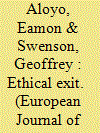| Srl | Item |
| 1 |
ID:
190699


|
|
|
|
|
| Summary/Abstract |
When should peacekeepers partially or fully withdraw from a country or region in which they are operating? This important question has received little scholarly attention. However, it has profound implications. If peacekeepers depart prematurely, as happened in Rwanda in 1994, the consequences can be disastrous with the potential to lead to widespread preventable deaths and human suffering. If they overstay, peacekeepers risk alienating the population they are seeking to protect and undercutting popular sovereignty at significant economic costs. Striking a balance, we propose a framework for just withdrawal that is both normatively compelling and empirically sound. It focuses on three aspects that are vital for understanding when peacekeepers can depart in an ethically justified manner: just cause, effectiveness, and legitimacy. By considering a number of objections, we also address critics who challenge the overarching premise of peacekeeping or might prefer different standards by which to suggest peacekeepers should stay or depart. Finally, we illustrate our argument with theoretical and empirical examples and a discussion of UN peacekeeping in East Timor.
|
|
|
|
|
|
|
|
|
|
|
|
|
|
|
|
| 2 |
ID:
190839


|
|
|
|
|
| Summary/Abstract |
In states emerging from mass violence and human rights abuses, do individuals prefer retributive punishment of perpetrators through trials, or do they wish to be compensated with land or monetary reparations for their injuries? How does the concrete option of prosecutions by the International Criminal Court (ICC) moderate these preferences? Using unique survey data from 507 Kenyans collected in 2015, we build on and add nuance to the empirical literature that interrogates the link between exposure to mass violence and post-conflict justice preferences. We find that while some individuals prefer reparative justice, victims and witnesses generally want perpetrators to be prosecuted. Even for those who are co-ethnics of government leaders – who allegedly instigated widespread killing, sexual assaults and displacements – direct exposure to those acts leads to greater desire for prosecutions. We further find that one’s personal experience with violence also leads one to reject domestic justice in favor of international justice: victims and witnesses who favored retributive justice are highly likely to believe that the ICC is the best option for prosecuting perpetrators.
|
|
|
|
|
|
|
|
|
|
|
|
|
|
|
|